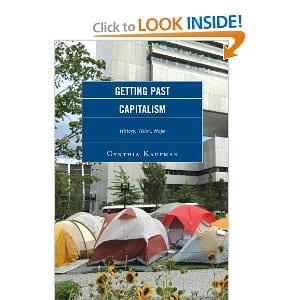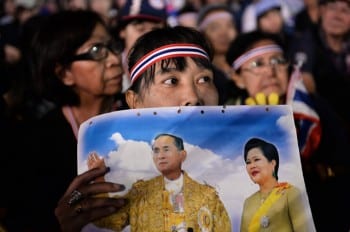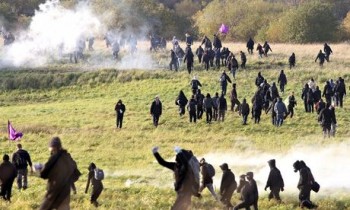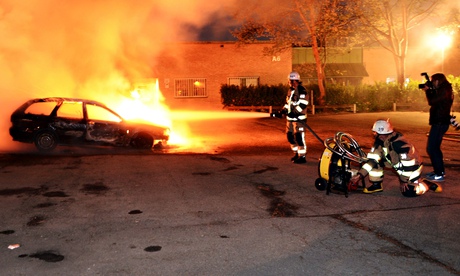Beyond Capitalism

I’m fond of books that don’t claim to have The Answer but instead are useful guides in our search for answers.
Such a volume is Cynthia Kaufman’s Getting Past Capitalism: History, Vision, Hope, which expresses in clear, concise language thoughts that likely have been bumping around in the minds of many of us who reject capitalism. The book is particularly powerful because of its modesty; Kaufman promises no new grand theory and instead offers insights that we all can use in our daily lives.
The only thing I didn’t like about the book when I first read it was its hefty hardcover price tag. Now the book has been released in a more affordable paperback, which sparked me to ask Kaufman to elaborate on her ideas.
A philosopher who draws on work from many disciplines, Kaufman is the director of the Institute of Community and Civic Engagement at De Anza College in Cupertino, CA, and also has experience as a union organizer and activist in the Central American solidarity movement and other struggles. She also is the author of the 2003 book, Ideas for Action: Relevant Theory for Radical Change.
Robert Jensen: Critiques of capitalism have been around since the beginning of capitalism. Is there anything distinctive about this moment? Mainstream society continues to operate as if “there is no alternative” to capitalism, but at the same time, the failures of capitalism are more evident than ever.
Cynthia Kaufman: Indeed, those failures are clear. The issue of inequality in this country, and the ways that money has captured our political system, are serious indicators of that. And climate change is a game-changer. We really are in serious trouble as a species if we stick with business as usual. We desperately need to find alternatives, and in fact we are surrounded by them.
Partially because these things have gotten so bad—but also because of the spectacular disaster caused by deregulation and the neoliberal model of capitalism on steroids that caused the world economic crash of 2008—people are beginning to see that the current system is not sustainable. That has opened up, for example, the space for the surprisingly positive response to the Occupy movement when it sprang up in response to the crash.
RJ: How would you characterize the struggle against capitalism? You point out there is no “command center” to target. How should we think about this struggle?
CK: The main argument of the book is that capitalism is constituted by a varied of different practices, and so challenging capitalism needs to be about a variety of struggles. I draw on the important work of J.K. Gibson-Graham, who argues that we should model anti-capitalist struggle on feminist struggles. Second-wave feminists didn’t look for an overthrow of patriarchy. Instead, they analyzed what they were up against and fought it in all of its varied manifestations.
One of the problems with traditional anti-capitalist thought is that it defines capitalism as a totality, which encourages us to imagine another totality, socialism, which we can try to replace it with. This totalizing perspective has colonized the imagination of anti-capitalism and left us waiting for a revolution we can never have.
In the book I argue that we see ourselves as inhabiting a complex social world that has some capitalist things going on in it as well as some socialist ones, some communist ones, and many where economics are not separated out of the broader fabric of life (such as sharing and gift giving, and mutual support). The way we get past capitalism is by building on the healthy non-capitalist aspects of our world while we also do pitched battle with the capitalist ones that we have a fair chance of winning against. In that way we build a better world and shrink the destructive capitalist practices that are part of the social fabric.
RJ: Although almost no one likes labels, in many situations we do have to apply labels to our politics. How do you describe yourself in the context of this critique of capitalism?
CK: That really depends on who I am talking to. I tend to not use the word “socialist,” because even though more young adults in the United States in a poll say they support socialism than do capitalism, the word socialism doesn’t have a lot of meaning in this country. Also, when I talk about alternatives to capitalism, socialism is one thing we need to build among many. I often refer to myself as a radical, reminding people that the word radical comes from the Latin word radix, meaning root. I think we need to get to the roots of problems as we try to solve them. I also like the word anti-capitalist.
I think a lot of people use the word progressive as a code for “left,” because it is a bold statement to call oneself a leftist in this country. I’m OK using whatever words communicate and get people with the program of building a socially just world.
RJ: How did you become a leftist?
CK: I grew up in a fairly non-political family. I come from a mixed Jewish and Catholic family with strong family memories of persecution, poverty, and class resentment. I grew up quite alienated from my surroundings in suburban San Diego, where white people were expected to be happy and content with the social world. I was always looking for ways to make life less flat and meaningless than it seemed to be. When I was 20, I read an article about U.S. support for the dictatorship in El Salvador. That moved me, and I contacted the organization mentioned in the article and asked if I could volunteer. I was quickly asked to do much more than that, and have been active in social justice politics ever since then. I now inhabit a social world full of meaning, inspiration, purpose, and interesting loving people.
RJ: Back to terms and labels. Help us understand the pros and cons of the terms we can use to describe a critique of capitalism. Let’s start with the three traditional terms from the left: socialist, communist, and anarchist.
CK: The terms socialist and communist are mostly about describing the world we want after capitalism, and I think they are both important. In my chapter on alternatives to capitalism I talk about the importance of pursuing multiple alternatives. I follow Richard Wolff and Steven Resnick in defining socialism as a mode of production in which the state is an important vector in taking and providing resources. States can be more or less democratic, and so can socialism. I think any ideal society that exists on a large scale, which is what we most likely have in store for us as a human race, will involve some aspects of socialism. Things like water and sewage systems require states in a large-scale society, but states are also a good mechanism for dealing with health care, education, public transportation, and infrastructure.
Communism then defines a society in which there are communal forms for dealing with resources. Many communal forms exist where there are not communist governments. The Mondragon cooperatives in Spain and the thousands of worker-owned cooperatives in the United States, are viable alternatives to capitalism.
For as long as I have been a leftist, I have been very sympathetic to anarchism, which I see as most importantly a critique of authoritarianism, and a caution against the accumulation of unjust forms of power. I think any healthy social movement needs some anarchist impulses to keep it honest. Anarchism as the name for an ideal total social form is a really complicated question. I have never found satisfying answers from anarchists about the definition of the state they are opposed to. Most are opposed to coercive forms of state power. Questions about large scale systems of organization and how they will be funded—those are questions it’s hard to get anarchists to give good answers to.
RJ: What about the seemingly endless debates about reform versus revolution?
CK: That is one of the most unproductive binaries in anti-capitalist thought. Most of the time, those terms function as frozen relics from debates within the German Social Democratic Party at the turn of the last century. In Marxism there are some very unhelpful ideas about the need to push for a revolution that will overturn all of society. Marx gets that from Hegel, and it leads to some very bad politics, such as the hope that things must get worse because that will then turn into the antithesis and get better from there. A kind of wishful thinking then grows out of not seeing a realistic path forward.
I think there is a legitimate critique of reformism, as a politics that is content with making small changes in society without asking for bigger and deeper changes. So in the book I talk about revolutionary reforms, meaning actions that we take in small ways to make the world a better place and disrupt some of the ways that capitalism is reproduced.
RJ: Is there an important distinction to be made between liberal and left?
CK: When I first came to political consciousness in the 1980s, it seemed important for people who shared my politics to call ourselves leftists and not liberals. Liberals were those who wanted a tolerant society but who weren’t willing to look at issues of power. Now after 30 years of the Reagan revolution with the liberal social welfare state under increasing attack, I think liberalism—meaning support for a welfare state and for public goods—needs to be defended. At this point in this country, it actually takes some courage to be liberal, and liberals are fighting for things I want them to be fighting for. So I’m all for liberalism, as well as leftism.
RJ: Based on your reading of the state of the world and what is possible through organizing and education, react to these pairs of words: optimism/pessimism.
CK: I am one who often quotes the Italian Marxist and anti-fascist philosopher Gramsci’s dictum that we should have pessimism of the intellect and optimism of the will. This means that we should have the courage to look our social problems fully in the face and understand just how huge are the problems that we are up against. And yet, the second part of that means that we need to look for the places where a difference can be made, and put our hearts into those cracks and fissures. We need to hold in our hearts the possibility of a better world, not because we have candy-coated the problems or lied about what we can accomplish, but because we know that we do often win and make a difference, and that all the good things we have in the world are the results of those who have had the courage and commitment to have done this work before us.
RJ: Another pair: success/failure.
CK: There is a cultural norm on the left of being afraid to declare victory, which is related to the binary of reform/revolution. Whereas reformists are winning small gains, revolutionaries don’t want people to be satisfied with those small victories because they worry this will lead to acceptance of the bigger picture of capitalism domination, and so they find a way to turn every victory into a defeat. In the book, I call for a culture of declaring victory wherever we can. You build movements and keep people in a struggle when it feels productive. Anti-capitalists have typically been the people in movements who have declared every gain to be a trick of the capitalist class to buy us off. That line isn’t very inspiring, and it shows no sensitivity to how social movements actually succeed.
RJ: Finally, hope/despair.
CK: I put hope into the title of the book, and my first reviewer said it was both startling and refreshing to see the words hope and capitalism in the same title. I think one of the reasons anti-capitalists tend to not have much hope is related to the ways we conceptualize what we are up against. Yes it is true that pro-capitalist forces have a lot of power. But so did slave-holding racists. We give ourselves hope when we conceptualize capitalism as a set of practices that can be challenged by fighting the piece of the puzzle we feel most compelled to fight.
Robert Jensen is a journalism professor at the University of Texas at Austin. He is the author of Getting Off: Pornography and the End of Masculinity (South End Press, 2007). He can be reached at rjensen@uts.cc.utexas.edu and his articles can be found online at http://uts.cc.utexas.edu/~rjensen/index.html.






